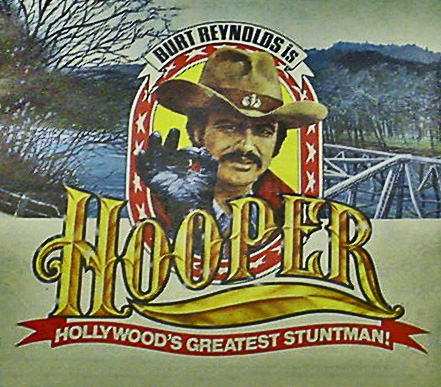
HOOPER
US, 1978, 99 minutes, Colour.
Burt Reynolds, Jan -Michael Vincent, Sally Field, Brian Keith, John Marley, Robert Klein, James Best, Adam West.
Directed by Hal Needham.
Hooper is a film about stuntmen and their work, rivalries, personal lives – especially ageing and the rivalry from younger actors. Direction is by Hal Needham, a stuntman himself from the 1950s to the 1990s. He had directed Burt Reynolds and Sally Field the year before this film in Smoky and the Bandit and was to direct a number of sequels as well as other films with Burt Reynolds including Stroker Ace. He also directed the two Cannonball Run films as well as Body Slam and a number of television series.
Burt Reynolds, forty-two at the time, portrays the middle-aged stuntman with Jan -Michael Vincent as his rival. Robert Klein is a producer who offers Reynolds a stunt which is spectacular. There is a great deal of stunt action in the film, romance between Sally Field and Burt Reynolds (who had appeared together in Smoky and the Bandit) and some comedy by veteran Brian Keith. Probably better than many of the other collaborations between Burt Reynolds and Hal Needham.
1. Popular 1970s entertainment, Burt Reynolds and his appeal, audience interest in stunts, style of film?making?
2. How good humoured a film? Critics said it was likable. The presentation of the main characters and their good nature, banter, the repartee on the film set, the banding together of the stunt people an a group, against the director etc.? Audiences participating in the life of the group making the film?
3. The film as a Burt Reynolds' vehicle? His particular personality on the screen, tough but charming, romantic, macho, stunts? A nonchalant hero, with quick repartee? The sub?plot of age, disillusionment, making of decisions about future? How well did these combine in the character of Hooper?
4. The appeal of the stunts and their visual presentation? The quality of the stunts with cars, the driving backwards, air jumps, chariot races, fights, the earthquake and fire sequences, the final leap? Why are stunts so watchable?
5. The place of stunts in movies? In such films as The Spy Who Laughed At Danger ? and the satire on the James Bond films with the reprising of the James Bond musical theme? The reality and unreality of stunts? Fantasy and exuberance?
6. The film's comments on movies and fantasy? Roger and his pretensions in making a spy thriller and yet having his eye on Fellini? The pretentiousness of his saying that he wanted to make a statement? His skill as a director, moods, using people? The yes?man ever present with him? Roger and embodying the pretentious aspects of film?making? The contrast with the producer and his worry about money, his talking and his delay his subscribing to humane principles yet going back on them for the money? The stuntmen within their context?
7. The presentation of the tradition of Hollywood stuntmen? Their strengths, place in films, abilities? The Brian Keith character embodying the older generation of stuntmen and the impact that they made ? their popularity, for example the children and the people responding at the Benefit? Hooper as the next generation forming a bond with the older generation yet edging him out? The arrival of the new generation? The threat to Hooper, his attitudes and his being reminded that he was like that? The emphasis on being a champion. a winner, record?breaker? The physical side and the numerous scenes of Hooper with his pills, going to the doctor, warnings? The older character and his stroke?
8. How well did the film delineate Hooper an a character? A pleasing character, a blend of niceness and toughness? His skill on the set? the derring-do and seeing him in action? The domestic side of his life and his love for Gwen? His attitudes towards marriage? Wariness of Ski, rivalry with the chariot race and then helping him? The bond between the two especially after the fight in the bar? The friendly rivalry, the decisions about the big leap? The emphasis on Hooper's fears, broken down, age? The significance of the scene of his looking at himself in the mirror and considering himself as flabby? The bonds with Kelly and Kelly as a yes?man and his finally hitting him hard?
9. The presentation of the older generation, the champion who had achieved something? His comments to Hooper and reminding him of what was happening to him? The good fellowship of the whole group, especially in the bar sequences, the telling of jokes, riding at the Benefit? His stroke, his resistance to it and his presence at the end?
10. Gwen as heroine, her being brought up in the world of stunts, enjoying them? Loving Hooper, worrying? The happy ending?
11. The character of Kelly and his place in the movie world, his being Hooper's buddy, being with him in all the ups and downs, hie being sacked? As an illustration of the bond between the men?
12. The character of Ski? new, hopes, vanity? Trying to outdo Hooper? Joining him in the fight? Their work together? The pressure about the big leap? The filming of this? the reasons for the two of them doing it, driving through the quaking city, their hesitation before the leap, their experience of it and the effect on them? His presence at the happy ending?
13. The film's satire on Roger and his style, self-importance, his short assistant?
14. Comment on the presentation of the world of film-making. The machinery and technology, Adam West as the hero and having stand-ins, the studio work, rehearsals, atmosphere? The background of the people participating - outings, fights, charity? The sequence with tying the policeman's bike?
15. Themes of risk, daring, masculinity? Doing stunts for themselves, for a wide audience?